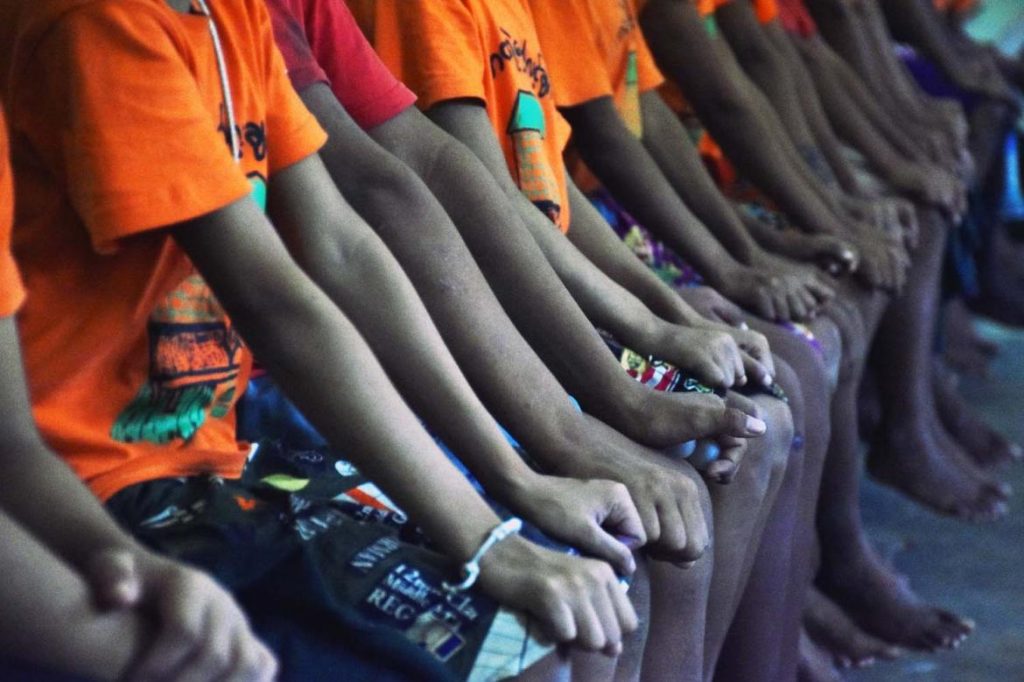Rohingya children caught travelling outside of Rakhine State without identity documents are being detained in vocational schools and rehabilitation centres in Yangon, where they rarely receive family visits.
By KYAW YE LYNN | FRONTIER
ON A Sunday night in late September, an old, wooden motorboat carrying 30 Rohingya Muslims disappeared quietly into the darkness from the shore near the Thae Chaung camp for internally displaced people, about 40 kilometres northwest of the Rakhine State capital, Sittwe.
Relatives of those on board prayed and waved as the boat pulled away into the Bay of Bengal. They were left undisturbed by the camp’s security guards, who only patrol the land entrance to the camp of about 12,000 people.
Among those who prayed for a safe passage was the mother of Ma Fatima, 16. (The names of all children mentioned in this article have been changed to protect their identities.)
“There was no moon that night and I was unable to see my mother, but I know she would have remained on the dock for hours after the boat left,” recalled the teenager.
Support more independent journalism like this. Sign up to be a Frontier member.
Fatima was seasick for most of the four days before the boat beached near Nga Yoke Kaung in Ayeyarwady Region’s southwestern Ngapudaw Township, where those on board – 15 women, six men, eight teenagers and a boy aged six – were detained on the evening of September 26 while crammed into an SUV heading for the regional capital, Pathein.
Fatima said the SUV that picked up the Rohingya after the boat came ashore was badly overcrowded. “Some complained about the situation and made a noise; I think that’s why we were arrested,” she said.
They were taken to the police station at Ngapudaw town and charged under the 1949 Residents of Burma Registration Act because they had no proof of identity or citizenship.
On October 4, the township court sentenced the 21 adults to two years’ imprisonment with hard labour. Of the eight teenagers, Fatima and the four other girls were sent to the Vocational School for Women in Yangon’s Bahan Township, and the three boys to the Hnget Awe San Youth Rehabilitation Centre in Yangon’s Kawhmu Township. The six-year-old boy was sent to Pathein Prison to join his mother, who was also among those sentenced.
Fatima told Frontier in an interview at the vocational school on October 31 that she had left Rakhine because her father had asked her to join him in Malaysia, where he has been living for about 10 years. Despite feeling restless in the camp, with little hope for the future, she was afraid of leaving her mother and the place she called home.
“As well as missing my father, there was nothing to do in the IDP camp; that’s why my mother allowed me to leave,” she said.
Though now a guarded IDP camp that residents are barred from leaving without official permission, Thae Chaung was a pre-existing village, and Fatima and her family were among its original residents. This meant that although Fatima was not technically an IDP, she was subject to the same movement restrictions.
Fatima does not speak Burmese and she was interviewed with the help of another Rohingya girl, Ma Sabayda, 15. Sabayda learned to speak Burmese after being sent to the school in February 2018 and serves as an interpreter for other Rohingya girls.
Sabayda, who had lived in Dar Paing, another IDP camp in Sittwe Township, also left her home by boat but said she had no intention of going to a foreign country. “I only wanted to visit my auntie and attend her son’s wedding in Yangon,” she told Frontier.
Traffickers put her and 20 other Rohingya, some from other parts of Rakhine such as Kyaukphyu, on a boat that took two days to reach Gwa, at the southern tip of Rakhine. There, they were bundled onto a truck bound for Yangon.
They nearly made it. Police stopped the truck at the Sarmalauk junction, in Ayeyarwady Region’s Nyaungdon Township, about 70 kilometres west of Yangon, on February 4, 2018.
Of those on the truck, 12 men and six women were sentenced to two years’ imprisonment under the 1949 Residents of Burma Registration Act, and Sabayda and another teenaged girl were sent to the vocational school for two years.
“In four months, I will be able to go home,” said Sabayda, who said she badly missed her father, mother and four siblings, who still lived in the Dar Paing camp.
Sabayda said she would never make another attempt to leave Rakhine, because it only created problems for her family.
“Without a national registration card I will never go anywhere again,” she said, referring to the pink-coloured Citizenship Scrutiny Cards, popularly called “NRCs”, that are the prime identity document for Myanmar citizens. She said no one in her family had such a card.
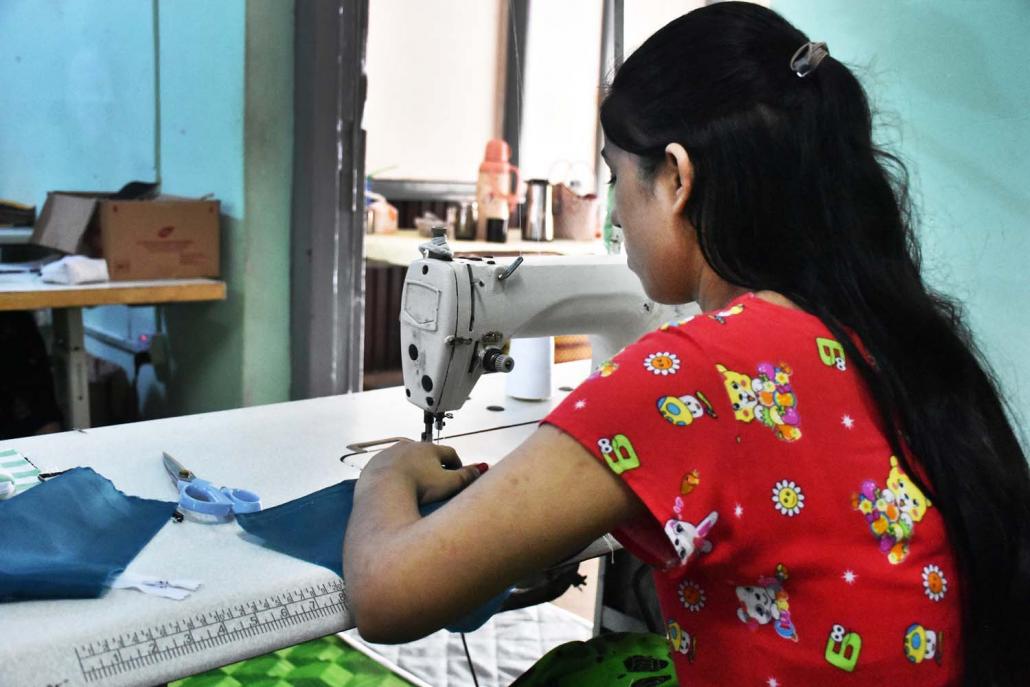
A Rohingya girl sews clothes at the Vocational School for Women in Yangon’s Bahan Township. (Steve Tickner | Frontier)
Training centres or prisons?
The vocational school for women in Bahan, the biggest and oldest of four such facilities operated by the Ministry of Social Welfare, Relief and Resettlement, was established in 1960 to house women who had been remanded in custody. In 1998, it was transformed into a vocational training centre for women and is run by the ministry’s Social Welfare Department.
The 1.6 acre (0.65 hectare) compound on Nat Mauk Street has three dormitories that currently house 141 women, most of whom are underage offenders or women regarded as being in need of social protection.
The head of the school, Daw Wai Wai Naing, said 19 of its trainees are Rohingya from Rakhine who tried to travel to Yangon or a foreign country.
“They were sent here after courts found them guilty of travelling without any valid documents such as an NRC,” she told Frontier on October 31.
“These Bengali girls are simple, and are more obedient than the other girls,” she said, using a term that many people in Myanmar reserve for the Rohingya to imply that they are migrants from Bangladesh. She added that, despite the language barrier, the Rohingya mix well with the other girls at the school, which has 15 staff.
“Metta is the most effective way of dealing with them because they are away from family and in need of being loved,” Wai Wai Naing said, using the Buddhist term for loving kindness. “I always tell them that they should think of us all as a family, at least while they’re here.”
“Without mutual understanding and metta, we would not be able to prevent them from running away,” she said. “No one has tried to run away since I was transferred here four months ago.”
The school has a high fence and a locked gate, but there are no professional security personnel. Nonetheless, Wai Wai Naing said family members of the young detainees often asked her if the school is a prison.
“I explain to them that this is not a prison, it is a training school that is providing your daughters or sisters with vocational skills,” she said, adding that the girls receive training in sewing, food preparation and making handicrafts.
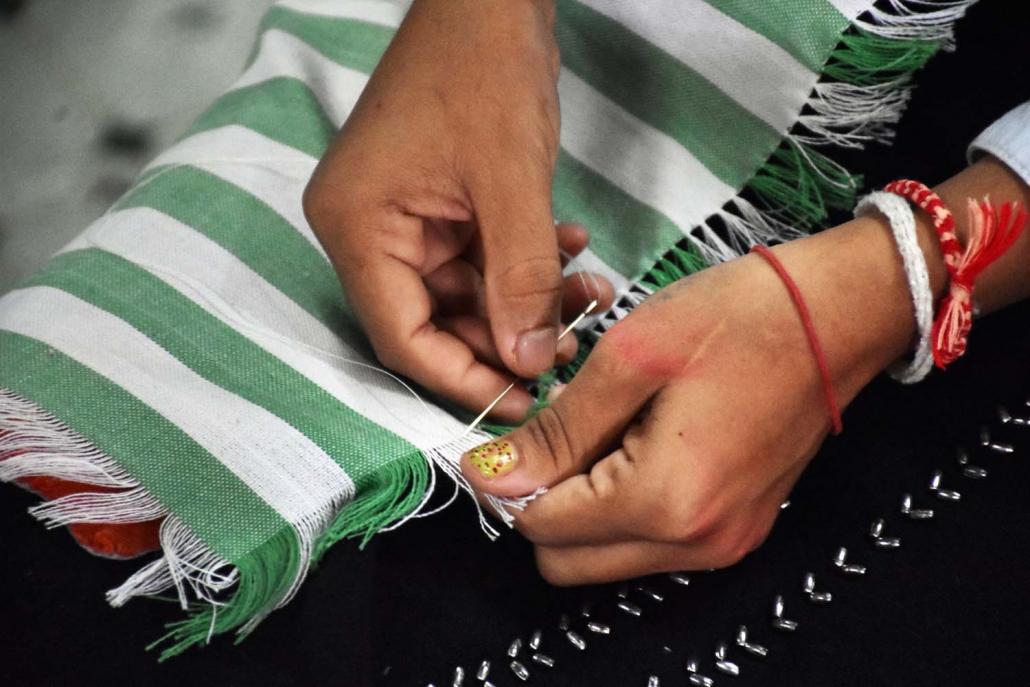
Sewing is among the skills taught at the Vocational School for Women. (Steve Tickner | Frontier)
No visitors
Family members are allowed to visit the girls at the vocational school once a month. However, the Rohingya girls rarely receive visitors, even if they have family in Yangon. Wai Wai Naing said this was most likely because visitors were asked to present identity cards, which most Rohingya lack as non-citizens.
The Rohingya girls at the vocational school and Rohingya boys at the Hnget Awe San Youth Rehabilitation Centre told Frontier that their relatives had never visited them. One of the boys blamed the movement restrictions that are imposed on most Rohingya because of their statelessness.
Ko Nurul, 17, told Frontier during a visit to the centre on October 20 that his relatives, as people deprived of citizenship documents, could not legally leave Rakhine. “We Muslims have no NRC,” he said.
Nurul was one of seven Rohingya with whom Frontier was permitted to speak freely in the library at the centre, where boys have the option of receiving formal or non-formal education, or training in seven vocations.
Originally from Sittwe’s West San Pya ward, Nurul said he was given a two-year sentence in late 2017 after police found 34 methamphetamine tablets in a motorbike taxi on which he was a passenger. He denied that the tablets were his.
His wife gave birth to a boy three months after he was sent to the centre 22 months ago.
The head of the centre, U Aung Soe Kyaw, said most of the Rohingya boys, including the six to whom Frontier spoke in the library, besides Nurul, were convicted of having travelled outside Rakhine without valid documents.
Of the 564 trainees at the centre, 35 are Rohingya, Aung Soe Kyaw said. The centre had hosted almost 100 Rohingya till June, when the immigration department took 60 of them back to their homes in Rakhine because they had finished their sentences.
“Family members can visit [trainees] once a month, but they must present an NRC or documents such as a Household List to show they are family members,” he said.
“The Bengali youth have never received visitors, so we sometimes allow them to talk with family members on the phone.”
The International Committee of the Red Cross was helping the youths at the centre who had no contact with family members to get in touch with relatives, he said.
“For example, if a boy does not know his family’s address, he will write them a letter that the ICRC will pass on to relatives after checking with the local authority, and it will bring the reply from his family back to him,” Aung Soe Kyaw said.
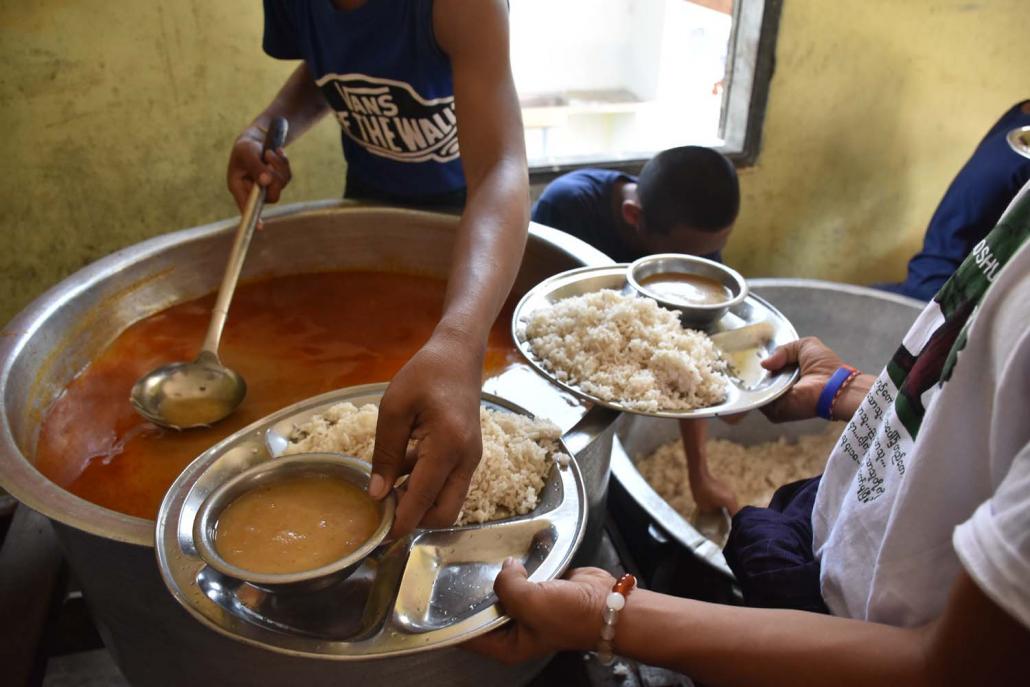
Steve Tickner | Frontier
A long walk to nowhere
One of the seven Rohingya boys with whom Frontier spoke is Ko Shafique, 15, from Wakan village in Rakhine’s Kyauktaw Township, who in January was sentenced to two years’ detention at the centre for travelling without valid documents.
In late December last year, Shafique, six adult Rohingya and a broker involved in human trafficking spent 18 days walking from Kyauktaw Township over the Arakan Yoma mountain range to western Bago Region, a distance of more than 500 kilometres.
“We walked day and night, but hid in the jungle in the day when we saw villages or people,” he said. “I was exhausted when I was walking and very afraid when we had to hide.”
They were arrested shortly after flagging down and boarding a bus bound for Myawaddy, on the border with Thailand, where the broker intended to hand them over to another broker who was to take them to Malaysia. Shafique said he couldn’t remember where in western Bago Region they boarded the bus; because this was his first trip outside of Rakhine, he was in a state of chronic confusion.
“It was the longest walk of my life and I did it because I wanted to join three of my brothers in Malaysia,” said Shafique. “I should be with them. I should not be here. I don’t want to be here,” he said. “I miss my parents. I want to be back home.”
After serving his two years’ detention, Shafique will be brought back to Rakhine. When Frontier asked him whether he’d ever attempt to escape again, he nodded without hesitation. “I’m not sure if I will ever make it to Malaysia, but I will definitely try to whenever I have the chance,” he said.
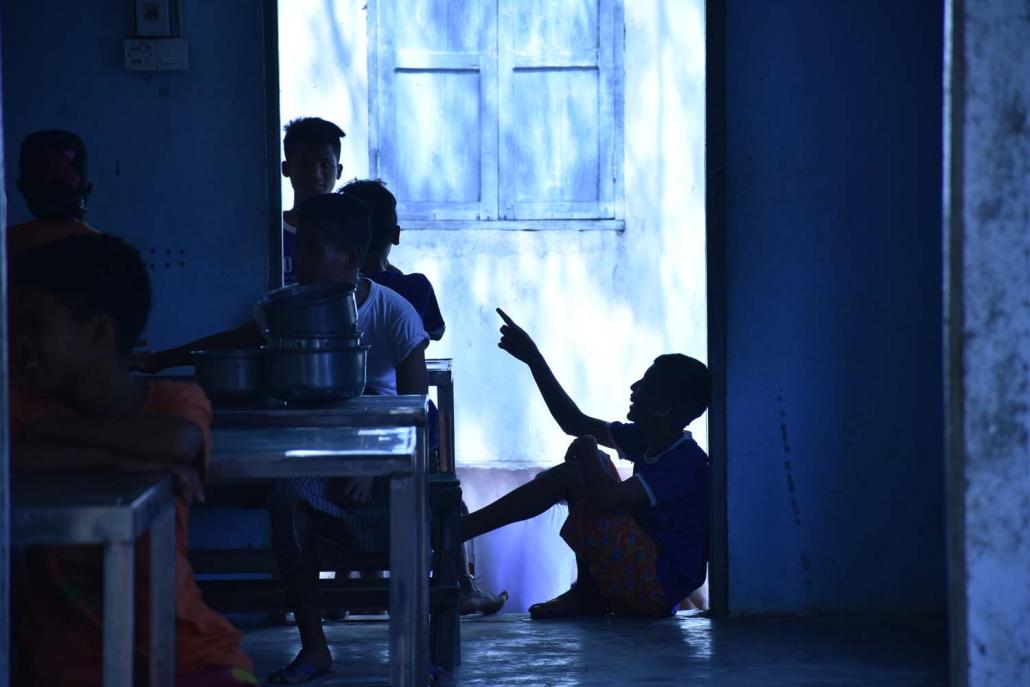
Steve Tickner | Frontier
No citizenship, no freedom
The majority of Rohingya in Rakhine State have been deprived of citizenship for decades. Many previously held tri-fold National Registration Cards, which carried citizenship rights, but the military regime withdrew these in the late 1980s. The immigration department replaced NRCs with Citizenship Scrutiny Cards, but unlike citizens elsewhere in Myanmar, few Rohingya received the new ID document.
Instead, they were given Temporary Registration Certificates, known as “white cards”, which indicated that their citizenship status was unclear. These cards offered them few rights: they were unable to own land, for example, or travel without government permission. Myanmar became known as the country with the largest stateless population in the world.
Following a controversy over whether white card-holders should be allowed to vote, the U Thein Sein government abruptly cancelled the white cards in early 2015. It introduced a new document, the National Verification Card, to replace white cards. The government has billed the NVC as a pathway to citizenship for the Rohingya, but very few have applied due to lack of trust built up over decades of broken promises from successive governments.
Regardless of whether they hold an NVC, Rohingya do not have the right to travel freely in Myanmar. The Rakhine State Advisory Commission, which the government created in 2016 to address the underlying causes of the Rakhine conflict, noted in its final report that the restrictions on freedom of movement had created economic hardship for the Rohingya while allowing many government officials to profit, because they issue travel permission documents in exchange for bribes.
In part because of this poverty, hundreds of thousands of Rohingya have left Rakhine State for other parts of Myanmar or for foreign countries, particularly Thailand and Malaysia. Without citizenship documents or permission to travel, they have to pay large sums to human traffickers and undertake risky journeys by boat, car or on foot. Like the children in this article, they are sometimes arrested by immigration authorities in Myanmar or abroad.
The Rakhine State commission, which was led by the late Mr Kofi Annan, said that increased freedom of movement for the Rohingya would be essential for “creating growth and sustainable development in Rakhine”. It recommended that freedom of movement be “delinked from the citizenship verification process, meaning that all individuals in Rakhine State should be able to move freely”.


